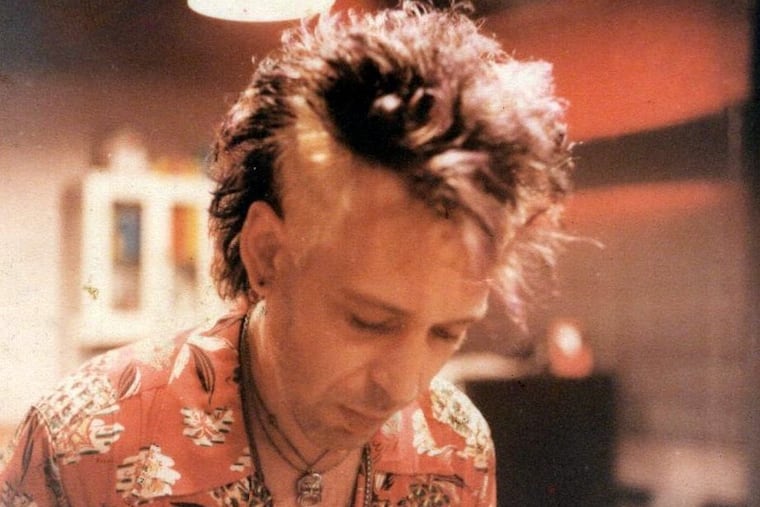He helped bring punk to Philadelphia. Now his band fliers are on display.
"These posters were our Twitter."

Before Bobby Startup does his first-ever exhibition of punk-era, collage-heavy fliers he created for The Hot Club — one of the country's first live punk venues, located at 21st and South Streets — know this: He wants a plaque on the Philadelphia Music Alliance's Walk of Fame.
He's joking.
But why not? He was integral in creating the aesthetic of Philly's alternative music and style scenes, first as a DJ at 40th and Walnut's legendary Inn-a-Go-Go in 1966, and as stage manager and photographer for Larry Magid's original Electric Factory at 21st and Arch starting in 1968, and then as resident artist/marketer at the Hot Club.
Startup's work will be featured at Queen Village's Trinity Framing with a collection of his original flier art and photos, and a limited number of prints available for sale, signed and numbered by Startup. "This is history — Philly history," says Dennis McHugh, who is mounting the show. "Music, graphics, and art."
On the style side, Startup, 72, ran California Earthquake at 13th and Pine — the premier U.K. clothier of rock-and-roll velvet and suede — in 1968 (he also had a piece of Skinz, the South Street punk boutique that predated South Street's Zipperhead). Many of his stylistic poses, sartorial and tonsorial, can be seen in several old photos that Startup is showing along with his fliers for the Hot Club, where Startup worked as an adviser, along with Bob Chipetz and Steve Apple, booked shows with the likes of Elvis Costello (who has moved up in the world and plays the Hard Rock Hotel & Casino in Atlantic City on Friday, Nov. 2 and Saturday, Nov. 3), the B-52s, Devo, Madness, Talking Heads, the Dead Boys, The Cramps, Iggy Pop, Dead Kennedys and more, often with his own band, the Autistics, opening.
In 1977, Startup, along with Hot Club bartender Ivan Weiss, persuaded venue owner David Carroll to let them book punk on Mondays and Tuesdays after a trip to New York City's legendary club CBGB to see the Dead Boys. "Those nights were Hot Club's slowest nights," says Startup. "David had live jazz on other nights, which was a hard sell to begin with. But we knew, then David knew, that there was a new scene developing in punk. We wanted to be on the ground floor."
Startup has been a consistent part of Philadelphia's sociocultural shift in sound and vision since he brought punk to the Hot Club: He went onto Chestnut Street's new-wave space the East Side Club in the early 1980s, Old City's after-hours punk and industrial club Revival in the late '80s and '90s, and Carroll's Bar Noir in the 2000s. And his fliers were always a part of such movement, especially at the Hot Club.
"Mostly when people did concerts then, they did generic posters on … cardboard with rainbow colors with the band names and venues — maybe a corny press photo — stuck on as an afterthought," said Startup. "That changed with the San Francisco scene and spots like the Electric Factory. Some of those posters were genuine works of art. … My stuff doesn't compare to how elaborate those '60s works were. I was just trying to alert people as boldly as I could — great photographs that made a witty or political comment and connected to the bands playing — because that was the only advertising we had. We weren't doing mainstream rock-and-roll. We had to do and use whatever we could."
Startup, Carroll, and the Hot Club couldn't afford to advertise in the Inquirer or the Bulletin. No critics were writing about punk. College radio was skint. So the Hot Club team plastered the city's telephone poles and its book, record, and coffee shops with Startup's posters. His art came from then-hard-to-find European fashion magazines or the locally published Famous Monsters of Filmland.
"Something to catch the eye and immediately get your attention," said Startup. "These posters were our Twitter."
"You could tell his artwork, his style, from across the street," McHugh said. " 'Bobby's up to something, let's check it out.' "
Startup mentions that Jello Biafra of the Dead Kennedys was so happy with the Dead Kennedys' poster art that he requested whatever else Bobby had created for other bands. "The Hot Club used them for scrap paper in the office," he said, about giving his fliers away to those who appreciated them. "Why not?"
SEE THIS
Bobby Startup and The Hot Club Retrospective
6 p.m. Saturday, Nov. 3 through Nov. 30, Trinity Framing, 701 S. 3rd St., free, trinityframing.com